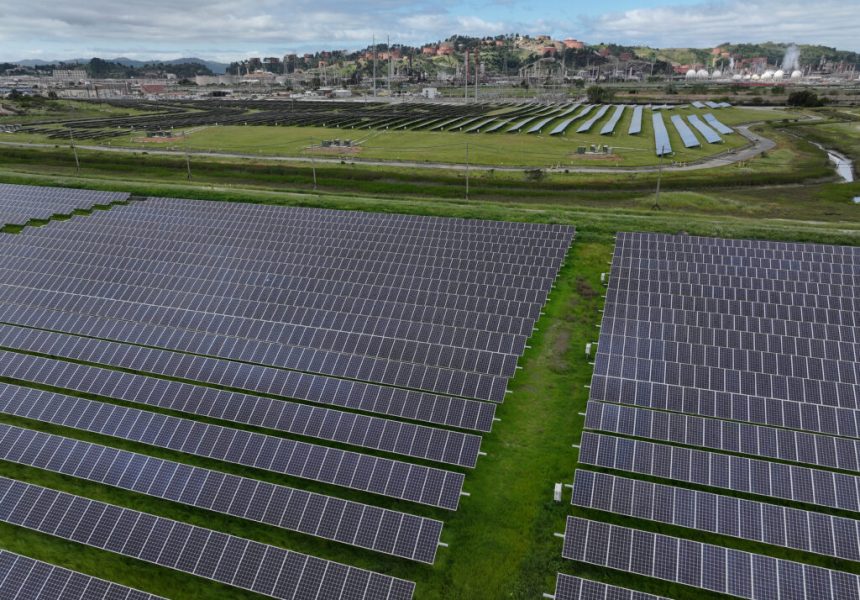In an aerial view, solar panels are seen at MCE Solar One solar farm on April 25, 2024 in Richmond, California. (Photo by Justin Sullivan/Getty Images)
Pennsylvania’s prime location, amid the nation’s largest population centers, made it an important hub for warehouses to distribute consumer goods. Hundreds sprung up along interstate highways in the last decade.
Those sprawling structures, some larger than 1 million square feet, could play a role in answering the commonwealth’s demand for renewable energy over the next decade.
Legislation under consideration in the state House Energy Committee would require new warehouses to be wired for solar panel installations and allow local governments to offer tax incentives to retrofit existing warehouses.
“We’re building warehouses along the corridors,” Pennsylvania State Building & Construction Trades Council President Robert Bair said in a hearing on the bill Monday. “We’re employing a lot of people in those jobs, but we have a lot of roof space just sitting there doing nothing, so we can put it to use now.”
SUPPORT: YOU MAKE OUR WORK POSSIBLE
Energy demand in the 13-state region that shares Pennsylvania’s power grid is forecast to skyrocket nearly 20% by 2035, according to PJM Interconnection, which manages the supply of electricity.
While long-range predictions call for new nuclear power plants to satisfy much of the demand and natural gas-fired plants to sustain the load until new technology comes online, solar energy will be critical, said Patrick McDonnell, president and CEO of PennFuture, a clean energy and environmental advocacy group.
Concerns about the reliability of natural gas generation were raised after winter storm Elliott froze supplies in December 2023 and contributed to surging electricity prices this summer that caused bills for some customers to leap by 10% to 30%.
“Diversification of the portfolio is critical in order for us to drive down those prices,” McDonnell said, adding that new standards for warehouse construction would ensure an opportunity to use their multi-acre roofs as sites for solar generation.
The bill is sponsored by Rep. Joshua Siegel (D-Lehigh), whose district is a hot spot for warehouse development. It would require new warehouses to be built with roof structures designed to carry the additional weight of solar panels. The measure would also require conduits for the electrical wiring and space for equipment to connect the panels to the grid to be included in the designs.
The Pennsylvania Department of Environmental Protection, which would enforce the legislation, would have the authority to grant waivers for projects where the installation of solar panels is unfeasible.
And local taxing authorities, such as townships, counties and school districts, would have authority to grant tax exemptions or special tax provisions to offset the increase in value of warehouses retrofitted to allow solar installations.
“Commercial rooftop solar is a great example of environmentally beneficial land use,” said Victoria Moroney, director of market development for ForeFront Power, which develops solar and storage projects in the United States and Mexico.
She added the use of warehouse roofs for solar energy puts generation close to electricity users and benefits ratepayers because it reduces the construction of new transmission infrastructure associated with new energy sources.
SUBSCRIBE: GET THE MORNING HEADLINES DELIVERED TO YOUR INBOX
“It’s not that any of these requirements are overly cumbersome or expensive,” Moroney said. “It’s just that warehouse developers don’t have this in mind when they’re developing their facilities, and that’s completely understandable.”
Energy Committee Chairperson Elizabeth Fiedler (D-Philadelphia) said New Jersey passed a law requiring warehouses larger than 100,000 square feet to be built ready for solar installations starting in 2022.
“The trade association for commercial developers in New Jersey explained that, in fact, warehouses with solar ready roofs are easier to lease than those that lack solar preparation, and this is part of the reason they supported it,” Fiedler said.
Rep. Martin Causer (R-McKean), the ranking Republican committee member, said he has concerns about making the new construction standards mandatory.
“That’s sort of a new level of government involvement, because this is private property. What if the owner doesn’t want to be solar ready? Isn’t that their right to not be solar ready?” he asked.
Bair said the legislation would be subject to discussion and amendments and that providing incentives to build to accommodate solar would be another option. But he said solar power is the fastest way to increase supply.
“I don’t like the government in my business,” Bair said. ”But I also understand that with our grid needs, solar is the most rapidly deployable excess energy we can put on right now.”
Rep. Paul Friel (D-Chester) compared the design requirements to any building code, such as accessibility or fire safety requirements. “It’s all saying there’s some public policy good that goes into that building code that benefits us as a society,” Friel said, adding that such mandates should come with a return on investment for the owner.
He asked what additional government action would be required to ensure warehouse owners would be able to sell solar energy produced on their rooftops.
“I don’t think it’s fair to increase cost, but not guarantee I have a market in place,” Friel said.
Moroney said warehouse owners would be able to contract with a solar power developer to design and construct installations on their rooftops. Where the warehouse itself has a demand for the power produced, the owner would have the option to enter a power purchase agreement to pay a set price for the energy and reduce uncertainty about energy costs.
In a scenario where the warehouse does not have sufficient energy demand to use all of the power, owners could make use of options such as virtual net metering. That’s where energy produced by a solar project is sold at a discount to subscribers elsewhere in the community. But, it would require additional legislation, Moroney said.
A bill to create a community solar option for consumers who can’t put solar panels on their own rooftops passed in the House last year but wasn’t considered in the Senate.
“It doesn’t exactly exist in Pennsylvania right now,” Moroney said. “So creating programs that enable options for these developers is going to be really important, because no, no warehouse is the same.”









